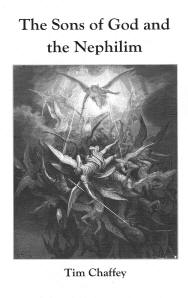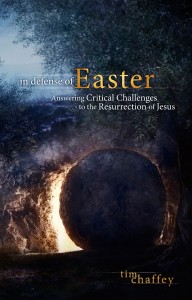A great deal of confusion exists concerning the subject of fallen angels and the Nephilim. With the release of the new Noah movie on DVD and Blu-Ray coming up, that confusion will likely increase. I’ve already seen and heard many Christians misrepresent the subject in their reviews of the picture. Aside from the film’s blasphemous portrayal of God and Noah as cruel and wicked, director Darren Aranofsky turned fallen angels into the heroes of the film who end up getting saved. [Note: For the sake of simplicity, in this post I will often refer to various classes of heavenly beings as angels, although this generalization may not be technically accurate in every case.]
Watchers
According to ancient Jewish works like the Book of Enoch, the Watchers were certain angels who decided to rebel against God by leaving heaven and marrying women. These ideas are expansions of the first four verses of Genesis 6, which speak of heavenly beings who rebelled against God in the same manner, although in this passage, they are called bene ha ’elohim (sons of God). The term “Watcher” is used in Scripture for heavenly beings in Daniel 4:13, 17. So it’s possible that the Watchers were also bene ha ’elohim, although that connection is not specifically made in the Bible. There are many different classes of angelic beings in Scripture (both good and bad), and the bene ha ’elohim are probably at or very near the top rung since they are a part of the divine council. (For articles on why the “sons of God” were not humans, see my critiques of the Sethite and Royalty views.)
The Divine Council
The divine council is the term used to describe an assembly that God held with certain heavenly beings. Glimpses of these meetings can be seen in Job 1:6 and Job 2:1 where Satan twice comes before God along with the sons of God (bene ha ’elohim). The council is also pictured 1 Kings 22:19–23 and 2 Chronicles 18:18–22 when the prophet Micaiah explains to King Ahab a vision of a discussion in God’s throne room. The Lord asked these heavenly beings who would persuade Ahab to go up to Ramoth Gilead so that he could fall in battle. After some discussion, a spirit said that he would go and be a lying spirit in the mouths of the false prophets. The “divine council” title is drawn from Psalm 82. Verse 1 in the ESV states, “God has taken his place in the divine council; in the midst of the gods he holds judgment.” There is so much more to this subject, but I need to save it for another time. Let’s return to the angels and the Nephilim.
Were Fallen Angels Good or Bad?
The film portrayed the angels who left heaven as being good guys who left because they felt bad for mankind after the Creator harshly judged them for eating the fruit. The Bible does not describe the angels mentioned in Genesis 6 in that light. Instead, the Bible explains that these spirits sinned (2 Peter 2:4), were disobedient (1 Peter 3:20), that they “left their proper abode” (Jude 1:6), and are being held in “chains of darkness, to be reserved for judgment” (2 Peter 2:4). Genesis 6:2 describes some of their activity. These “sons of God” (bene ha ’elohim) saw women and decided to marry them. They were not well-intentioned beings who wanted to help mankind. Instead, these once-holy creatures decided to leave heaven and rebel against their Creator and corrupt His creation, primarily mankind.

My Th.M. thesis, The Sons of God and the Nephilim is available in print or for Kindle.
Confusion about Nephilim
There is also a great deal of confusion about the “Nephilim” or “giants” depending on translation (Genesis 6:4). Many people think that the “sons of God” are the same beings as the Nephilim, but this is not what the Bible teaches. The Nephilim are the offspring of the “sons of God” and women. Look at this verse in two different translations:
There were giants (Heb. Nephilim) on the earth in those days, and also afterward, when the sons of God came in to the daughters of men and they bore children to them. Those were the mighty men who were of old, men of renown. (Genesis 6:4, NKJV)
In those days, and for some time after, giant Nephilites lived on the earth, for whenever the sons of God had intercourse with women, they gave birth to children who became the heroes and famous warriors of ancient times. (Genesis 6:4, NLT)
The NLT does a better job at explaining some of the nuances in the text. It rightly translates the Hebrew word ‘asher as “whenever” instead of “when.” This may seem like a minor distinction, but the word implies actions that were repeated in the past and continued to occur at occasional or fixed interval (See Gesenius’ Hebrew Grammar, Section 107.e.b). “When” can convey this meaning but often gives the impression that something happened one time. That is not what Genesis 6:4 states. It tells us that the Nephilim (giants) were on the earth “whenever” the sons of God (bene ha ’elohim) mated with human women. It also answers the question as to how the Nephilim were on the earth both before (Genesis 6:4) and after the Flood (Numbers 13:33).
The film shows the rebellious angels become rock giants when they hit the earth. So in the film, the fallen angels are giants. On the contrary, while the Bible says nothing about rock giants, it does explain that the fallen heavenly beings fathered the giants.
What Does “Nephilim” Mean?
I think one of the major reasons for the confusion on this subject is that so many people have promoted the view that the word Nephilim comes from the Hebrew verb naphal (“to fall”). Hence, they argue that the term means “fallen ones.” But this common argument is false. If one wanted to use naphal as a participle (i.e. “fallen ones”), the word would become nephulim or nophelim—NOT Nephilim. The word Nephilim actually comes from the Aramaic noun Naphil. When this word is made plural, it becomes Nephilin, and when brought into Hebrew, it becomes Nephilim.
What does the Aramaic word Naphil mean? It is the word for “giant.” So Nephilim really does mean “giants,” which is exactly how the KJV and NKJV have translated it. It’s also exactly how the Nephilim are described in the only other passage that mentions their name. When the spies searched out the land we are told in Numbers 13:22 that they saw the descendants of Anak in Hebron (Ahiman, Sheshai, Talmai). When they reported back and tried to persuade the people not to enter the land, the spies said that the people there were of great stature and that they saw the Nephilim there. A parenthetical note in v. 33 explains that the Anakim are from the Nephilim. These giants may have also engaged in eating humans. No wonder the spies were so scared—though they should have trusted that God could do to the land’s inhabitants what He did to the Egyptians.
Inevitably someone will claim that Nephilim means “fallen ones.” After all, a ton of web articles and many popular level books teach this. Yes, they do, but they are wrong. I used to believe it meant this (and wanted it to), but in doing the research on my thesis, I found only one commentary out of more than 20 that proposed this definition, but even that one mentioned the problems with such a claim. Every lexicon I checked defines Nephilim as “giants” (HALOT, BDB, Davidson, NIDOTTE, Jastrow). So before commenting on this article and leaving that response, please be sure you can back it up with support from a lexicon or academic commentary.
Conclusion
So to summarize these points:
1) The “sons of God” (bene ha ’elohim) are heavenly beings and were very likely members of the divine council.
2) The “sons of God” (bene ha ’elohim) are not the same as the Nephilim.
3) The Nephilim are the offspring of the “sons of God” and women.
4) The word Nephilim means “giants.”
Perhaps the more important point to close out this article is that Aranofsky’s movie is a blasphemous film. Noah and God are portrayed as evil and vengeful. Noah is willing to kill people to protect a dog-like creature that is already dying. He wants to murder his own grandchildren. Meanwhile, the fallen angels are the good guys who help Noah build the Ark and then end up going to heaven in the end when they die while fighting against people who want to get on the Ark. Aranofsky didn’t just miss by a little bit with this film, he intentionally contradicted Scripture at nearly every point. For a full review of this film, see my critique (https://answersingenesis.org/noahs-ark/noah-movie-detailed-review/).



